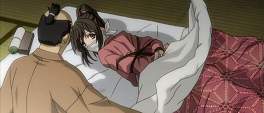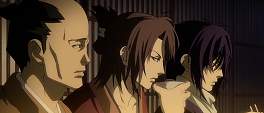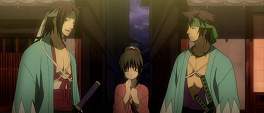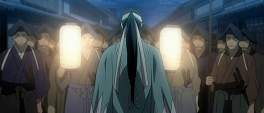In the first three episodes of Hakuouki - Shinsengumi Kitan, activities are split evenly between: smouldering with masculinity while lounging around in a den of exposed chests, or looking doe eyed and getting saved by gentlemen heroically cutting up other gentlemen. Building on the romance game source, its target audience is plain to see, however the female protagonist at the centre of this bevy of testosterone is so bland that it's tricky not to see her as an empty husk of a character, aimed to cover a myriad of Mary Sue paradigms. To its credit, the swords and scheming is interesting if not entirely unoriginal and the supernatural undertones of the opening scenes are left mostly unexplored. The most telling aspect however is Studio Deen's involvement which despite a solid if lacklustre start, bodes ill for the remainder of the series.
Chizuru Yukimura is a long way from home, after her father came to Kyoto for his work he disappeared; she followed only to be caught up in a common street scuffle. Members of the Shinsengumi, a local vigilante group, defeat her pursuers and take her into their custody claiming she may need to be killed if she is found to have witnessed their fight. It transpires however that her search for her father, a doctor, coincides with the mission they have been tasked with after his disappearance. As Chizuru begins to ingratiate herself with the group, she becomes involved with the Shinsengumi's battle against a group rebelling against the ruling class; an successful attack is launched on their headquarters in which she plays a pivotal role. Her time with the group may have only just begun but they may be the best way for her to find out what has happened to her father.
Pitched towards the younger, female market, the series is replete with a plethora of chiselled males who vary in age and disposition from young and brash to aged and refined. What is undeniable however is that they all aim to encapsulate a particular fetish whether that is the bookish thinker, the heroic protector or the strong and silent, each is equally gifted with looks ranging from the masculine to the androgynous. The first episode plays with the latter by having the lead masquerade as a boy - this does not fool all members of the group however and gender confusion abounds. Either sex would have worked for the protagonist and the romance would have remained largely unchanged, the implications however would have differed mostly due to the ages involved - it avoids the implied tawdriness of a young boy in the midst of burly men with the inferred innocence of a young girl with blossoming emotions for her elders. This scattershot approach to potential partners isn't unique to female focused romance series but it is odd to see such a vast number of archetypes together, especially with only a projected thirteen episodes - the potential to adequately explore each of them is in serious doubt.
This doubt increases when taking into account the supernatural undertones of the Shinsengumi with ominous portents of wayward comrades and a mysterious medicine mentioned in the first three episodes, resulting in a tangible undercurrent of tension running in the group and repeats of episode one's spontaneous eruption of manliness are sure to follow. Covering the quiddities of an expansive cast and satisfactorily concluding a mildly promising storyline may be asking too much of the production staff who have little other noteworthy series to their names. More likely the plot will be sidelined in favour of more character led drama with the tiny victories of a short challenge-conclusion mechanic demonstrated with the injury of a Shinsengumi member. Elsewhere a distinct lack of uniqueness is present in secondary characters: cannon fodder are given throwaway faces and hairstyles while the token ninja of the story shares more than a passing resemblance to those found in series such as Naruto.
Without a frame of reference for Hakuouki - Shinsengumi Kitan and how it advances or regresses the romance genre, it is difficult to judge its enduring quality. Objectively the first three episodes stand as an aesthetically muted, vocally competent but generally uninspiring tale of a young girl with a missing father caught up in a bloody battle for stability in feudal Japan. No part stands out as particularly well crafted but whether there is a subtext to the character's actions and words that is opaque to those unfamiliar with this genre's trappings will perhaps find some depth to the series although the constant explanations of an individual's motives would suggest otherwise. It is unlikely the series will conclude with a distinct choice of partner for the glassy eyed waif, regrettably trapped and surrounded by the most desirable of men, however it may remain entertaining enough to be worthwhile for fans of the genre.







